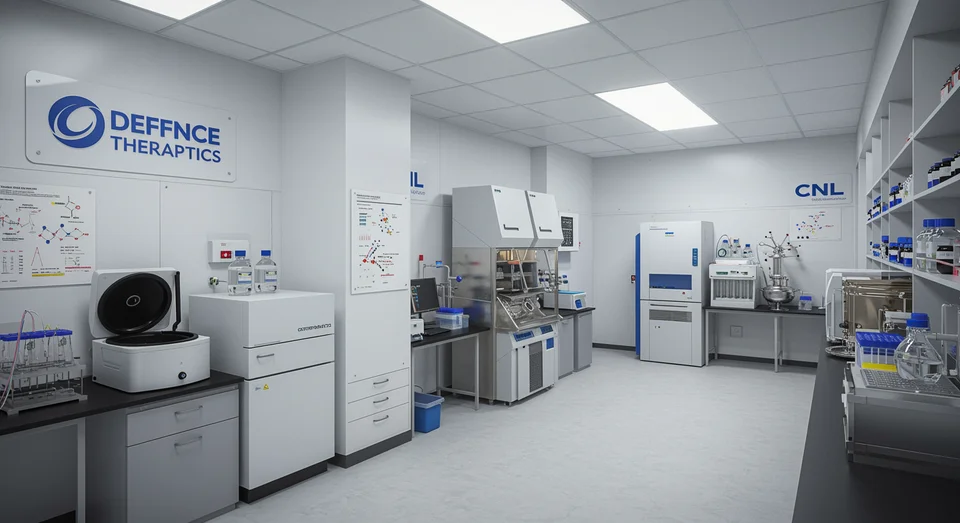Defence Therapeutics and CNL Partner to Advance Precision Cancer Therapies with Actinium-225
145 views
The pursuit of innovative cancer treatments has gained new momentum with the partnership between Defence Therapeutics, a clinical-stage biotechnology company, and Canadian Nuclear Laboratories (CNL). Together, they are exploring the potential of targeted radiotherapies using Actinium-225 (Ac-225), a promising radioisotope capable of emitting alpha particles that disrupt cancer cells' DNA and induce cell death. This collaboration represents a significant stride in precision oncology, a field that seeks to deliver highly targeted therapies while minimizing collateral damage to healthy tissues.

At the heart of this advancement lies Defence's proprietary Accum® technology, an ingenious platform designed to address a critical challenge in Ac-225-based therapies: the entrapment of Ac-225-antibody complexes within endosomes. These cellular compartments often act as barriers, preventing therapeutic agents from reaching their intended target—the nucleus of cancer cells, where DNA damage can effectively trigger cell death. Accum® technology enhances the escape of these complexes from endosomes, thereby improving their delivery to the nucleus. This breakthrough not only amplifies the therapeutic potency of Ac-225 but also opens the door to lower dosage levels, potentially reducing the side effects that often accompany radiopharmaceutical treatments.
CNL's role in this partnership is equally vital. The organization will produce Ac-225 and conduct rigorous preclinical evaluations of Accum®-modified antibodies in rodent models. These studies will focus on biodistribution, therapeutic efficacy, and safety, providing critical insights into how the modified antibodies interact with tumors and surrounding tissues. The ultimate goal is to assess their impact on tumor growth and refine the approach for future clinical applications.
This collaboration is a response to the limitations that have long plagued radioisotope-based cancer therapies. While Ac-225 holds immense potential due to its alpha-emitting properties, its therapeutic application has been constrained by challenges in effective delivery and concerns about off-target toxicity. By integrating Accum® technology into Ac-225 therapies, Defence and CNL aim to address these issues head-on, advancing the frontier of precision oncology. Such efforts are particularly timely given the rapid growth of the global radiopharmaceutical market, which is projected to reach USD 16.87 billion by 2033.
Defence Therapeutics is no stranger to innovation in cancer treatment. The company's focus on developing next-generation radio-immuno-conjugates and antibody-drug conjugates (ADC) products underscores its commitment to pushing the boundaries of what is possible in oncology. Accum®, as the centerpiece of Defence's technology platform, exemplifies this ethos by offering a versatile solution that enhances the delivery and efficacy of therapeutic agents. Defence's CEO has expressed confidence in the platform's ability to amplify anti-cancer effects while minimizing side effects, a balance that remains elusive in many current treatment modalities.
The implications of this partnership extend far beyond the immediate scope of Ac-225 therapies. By demonstrating the feasibility and benefits of Accum® technology in preclinical studies, Defence and CNL are laying the groundwork for broader applications in radiopharmaceuticals and beyond. The enhanced precision and reduced toxicity achieved through this approach could revolutionize how oncologists approach cancer treatment, making therapies not only more effective but also more tolerable for patients.
Moreover, this collaboration highlights the growing importance of interdisciplinary partnerships in advancing medical science. The integration of biotechnology expertise from Defence with nuclear science capabilities from CNL exemplifies how diverse fields can converge to tackle complex challenges. Such collaborations are increasingly vital as the demands of precision medicine require solutions that are both scientifically rigorous and clinically practical.
The burgeoning radiopharmaceutical market serves as a testament to the rising demand for innovative cancer treatments. As the industry evolves, companies like Defence Therapeutics are poised to play a pivotal role in shaping its trajectory. Their focus on precision, efficacy, and safety aligns with the broader goals of modern oncology, which seeks to move away from one-size-fits-all approaches toward tailored therapies that address the unique characteristics of each patient's disease.
In reflecting on the broader significance of this development, one cannot overlook the human dimension of cancer treatment. For patients and their families, the promise of more effective and less toxic therapies represents hope—a chance for better outcomes and improved quality of life. The work being done by Defence and CNL is not just about advancing science; it is about making a tangible difference in the lives of those affected by cancer.
As this partnership progresses, it will be fascinating to see how the findings from preclinical studies translate into clinical applications. The journey from laboratory to bedside is often fraught with challenges, but the potential rewards are immense. If successful, the integration of Accum® technology into Ac-225 therapies could herald a new era in cancer treatment, one defined by precision, innovation, and compassion.
